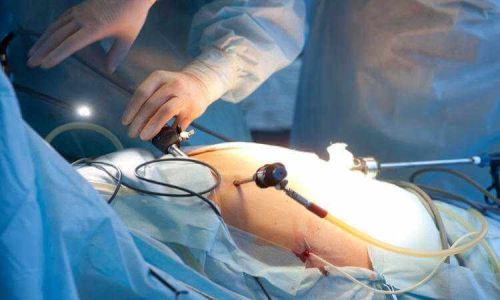





Laparoscopy, commonly referred to as minimally invasive surgery or keyhole surgery, is a surgical method that enables medical professionals to carry out a variety of operations through tiny abdominal incisions while utilizing a laparoscope. A laparoscope is a small, flexible tube with a camera and light source at its tip that allows surgeons to see within the body while operating on a patient.
Book AppointmentLaparoscopic surgeons with extensive training and expertise can be found at Paarasmani Hospital in Pune. These doctors carry out a variety of laparoscopic treatments, catering to diverse medical issues, using cutting-edge equipment and sophisticated techniques. The best laparoscopic surgery facility in Pune can provide you with top-notch treatment and results whether you need gynecological, gastrointestinal, urological, or other surgical interventions.
Consider criteria like a laparoscopic surgery specialist's credentials, expertise, patient testimonials, and hospital amenities while selecting one in Pune. Modern infrastructure can be found in many healthcare institutions in Pune, ensuring that patients get the best treatment possible throughout their surgical process.
You can be sure that there are many possibilities for laparoscopic surgery in Pune whether you live there or are thinking about visiting for the procedure. These renowned hospitals and surgeons are committed to patient-centered care, making sure that every patient receives individualized treatment plans and caring support from diagnosis through recovery.
Consultation: Your doctor will discuss the reasons for the laparoscopy and its potential benefits and risks with you.
Preoperative preparations: You may be required to fast for a certain period before the surgery and follow specific instructions regarding medications and other activities.
Anesthesia: You'll receive anesthesia to ensure you are comfortable and pain-free during the procedure. It could be general anesthesia (where you are unconscious) or local/regional anesthesia (numbing a specific area).
Insertion of the laparoscope: The surgeon will make a small incision near the belly button and insert the laparoscope to view the abdominal or pelvic organs.
Additional incisions: Depending on the procedure's complexity, the surgeon may make one or more additional small incisions to insert surgical instruments.
Procedure execution: The surgeon will perform the necessary diagnostic or surgical tasks using the laparoscope and instruments.
Closure: After completing the procedure, the incisions are closed, often with dissolvable stitches or surgical tape.
Recovery: You'll be taken to the recovery room after the procedure, where medical staff will monitor your condition until you wake up from anesthesia.
Hospital stay: Laparoscopic procedures generally have shorter hospital stays compared to open surgeries, but this may vary depending on the type and complexity of the surgery.
Pain management: Some mild discomfort or pain around the incision sites is normal, but it can be managed with pain medications prescribed by your doctor.
Activity and diet: Your surgeon will provide specific instructions on activity restrictions and dietary guidelines to promote healing and minimize complications.
Follow-up: Attend all scheduled follow-up appointments with your doctor to monitor your recovery progress and address any concerns or questions. Following your doctor's post-operative instructions carefully is crucial to ensure a smooth recovery. Every patient's situation is unique, so always consult with your healthcare provider for personalized guidance.
Less Invasive: Laparoscopy uses smaller incisions than open surgery, which results in less stress, less discomfort, and quicker recovery times.
Minimal Scarring: Tiny scars from small incisions are less prone to infection and have a better aesthetic appearance.
Shorter Hospital Stay: Patients frequently stay in the hospital for shorter periods after laparoscopic surgery, lowering medical expenses.
Quicker Recovery: Patients often experience quicker healing and can return to their regular activities more quickly because of less tissue damage.
Less Blood Loss: Less blood is lost during laparoscopic surgery, which minimizes the need for blood transfusions.
Pune is unquestionably a location to take into consideration if you're looking for the top laparoscopic surgery services. For people in need of minimally invasive surgical procedures, it is a favored destination thanks to its reputed laparoscopic specialists and top-notch medical facilities. The neighboring communities of Magarpatta City, Hadapsar Gadital, Amanora, Kharadi, BT Kawade Road, Handewadi, Wanowrie, Manjri, and Phursungi can take advantage of Paarasmani Hospital's services.